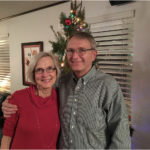If growing up in a race-less bubble had been possible during the turbulent 1960s and the uncertain ’70s, my friends and I did it.
We lived in the small ranching/petroleum-producing town of Perryton, way up in the Texas Panhandle, about seven miles from the Oklahoma state line. During the 10 years my family called Perryton home—late 1963 through 1973—only one African-American lived there, too. He was a college student and came to town for three months to work in the oil fields. The churches fought over him. Recruited him hard. He was “the” celebrity of the summer.
During those years, African-Americans avoided some communities across the South and Southwest because they weren’t safe there after sundown.
Ochiltree County demographics
I wasn’t a savvy sociologist, so my demographic deductions weren’t sharp. But I don’t think Perryton was like that. Practically everybody in Ochiltree County ranched/farmed, pumped oil and gas, taught school or owned a business, and African-Americans just didn’t have jobs there.
That’s not to say Perryton would have been a peaceful oasis for African-Americans. The few Hispanics who lived there integrated well into the schools and the life of the community. While racial slurs about blacks were not unheard, they always seemed esoteric, since nobody was around to actually slur.
The first time I touched an African-American, I blocked him on a football field. We were in the seventh grade, and we played one of the junior high teams from Borger. He was tough, too. We lined up and shook hands after the game.
As a child, I felt I had a lot in common with Martin Luther King Jr., but our in-commonness had nothing to do with race. He was a Baptist, like we were; and he was a preacher, like my daddy. I always figured his children and I would enjoy the same kind of Sunday dinner and probably knew a lot of the same Bible verses, and we all knew what it was like living in the fishbowl of a church parsonage.
On Dr. King’s side
Sign up for our weekly edition and get all our headlines in your inbox on Thursdays
One day at noon, I also realized our family was on the same side as Dr. King. We had been seated in a restaurant—knowing the times, it probably was the coffee shop of a motel. Before the waitress brought our food, an African-American lady came in and sat down at a table.
The manager of the restaurant walked over and talked to her. I don’t remember if we could hear what he said, but we watched her get up and leave.
Then Daddy walked over and talked to the manager. I don’t remember all the details, but I know Daddy pleaded with him to let her stay. I think he even asked if she could stay if she sat at our table. In a minute, Daddy walked back to our table and said, “Get up; we’re leaving.”
Daddy’s loudest sermon
I don’t think he explained why we left without touching our food. But silently, Daddy preached the loudest sermon I ever heard. He insisted we would not cooperate in segregating, separating, punishing or ostracizing people because of the color of their skin. He declared all of us are God’s children, so we’re all sisters and brothers, and we don’t misuse and abuse family.
Not much later, a rifle fired in Memphis. It killed Martin Luther King Jr. and wounded our nation. It also strengthened millions to embrace his dream. He told us:
I have a dream that one day this nation will rise up and live out the true meaning of its creed: “We hold these truths to be self-evident: that all men are created equal.” …
I have a dream that my four little children will one day live in a nation where they will not be judged by the color of their skin but by the content of their character. … Little black boys and black girls will be able to join hands with little white boys and white girls as sisters and brothers.
Not there yet
I have a dream today.
I have a dream that one day every valley shall be exalted, every hill and mountain shall be made low, the rough places will be made plain, and the crooked places will be made straight, and the glory of the Lord shall be revealed, and all flesh shall see it together.
Our nation has progressed since Dr. King dreamed that dream. But we have not seen the dream fulfilled. We are not there yet. In fact, sometimes, we seem to have regressed lately.
Only when we fully embrace the gospel he preached—we’re all God’s children, created in God’s image, loved and valued equally by God—will we come close.














We seek to connect God’s story and God’s people around the world. To learn more about God’s story, click here.
Send comments and feedback to Eric Black, our editor. For comments to be published, please specify “letter to the editor.” Maximum length for publication is 300 words.